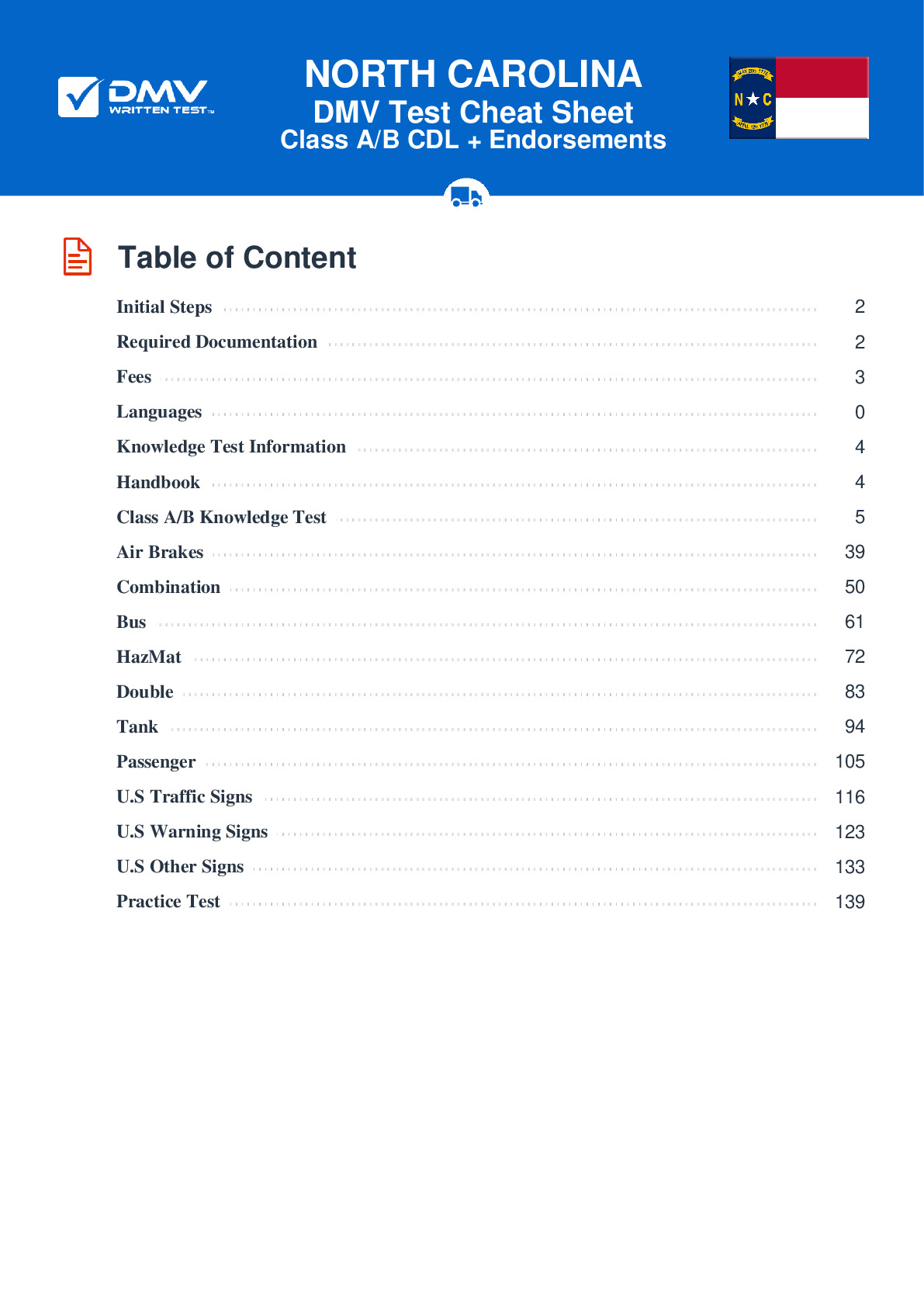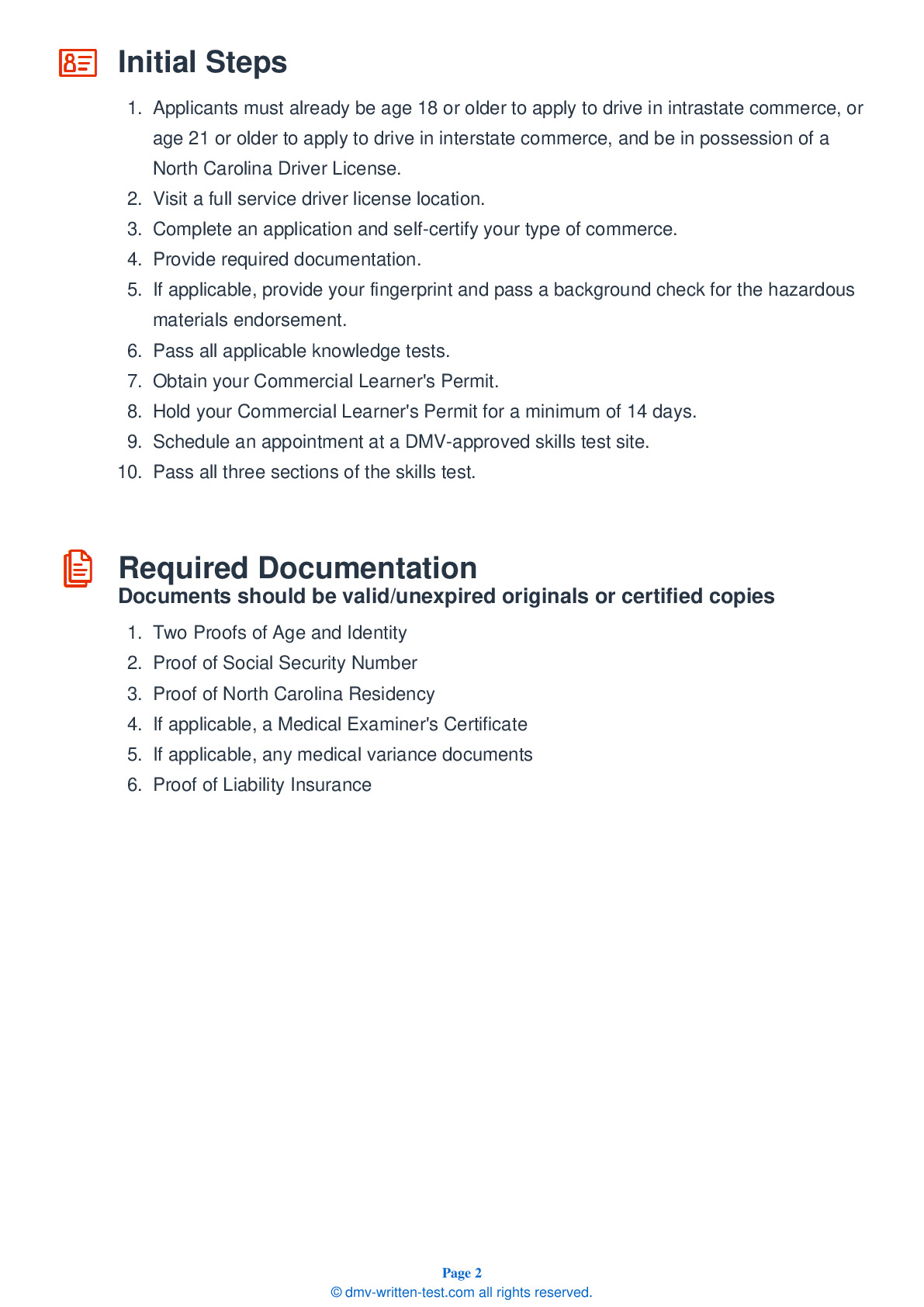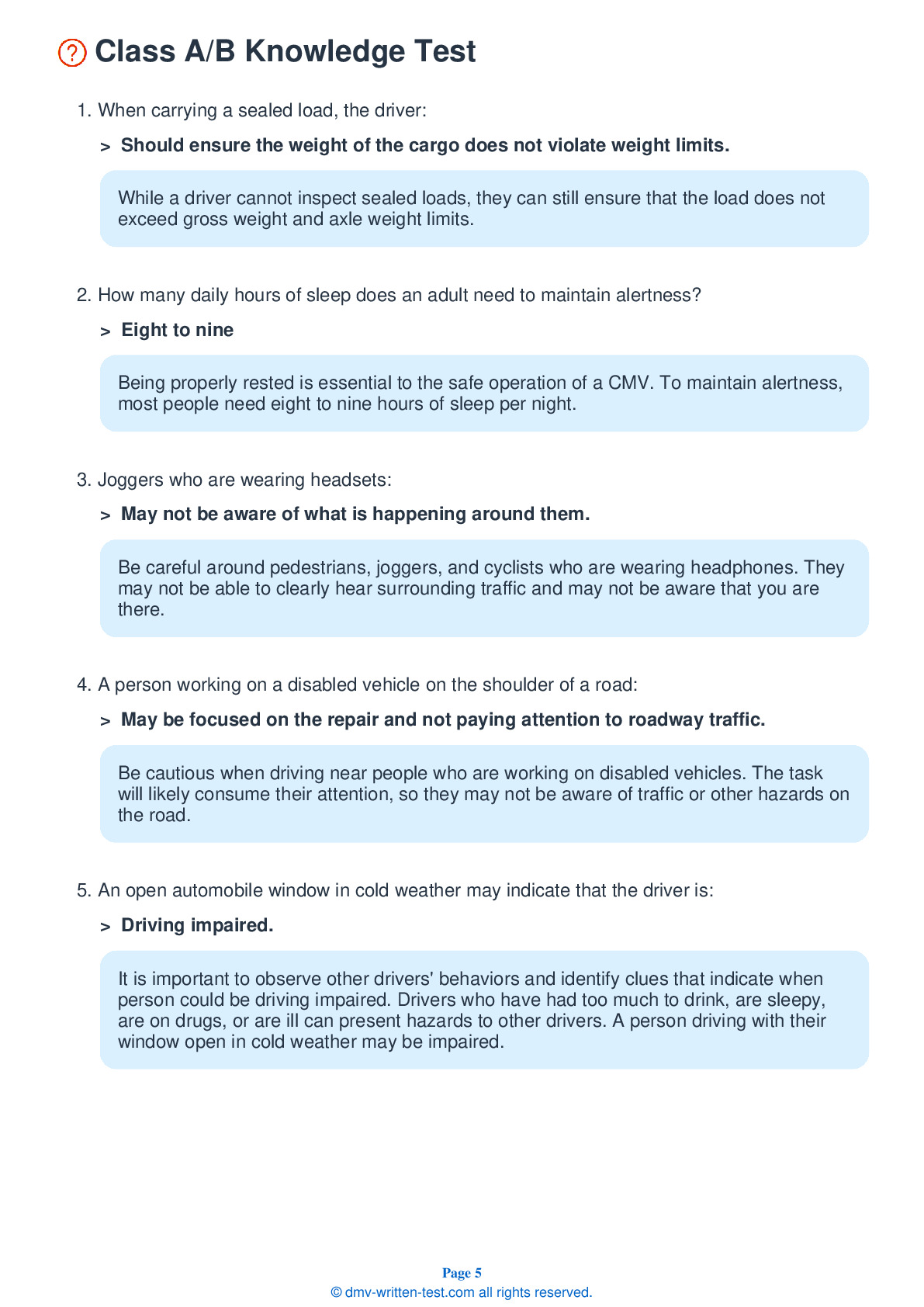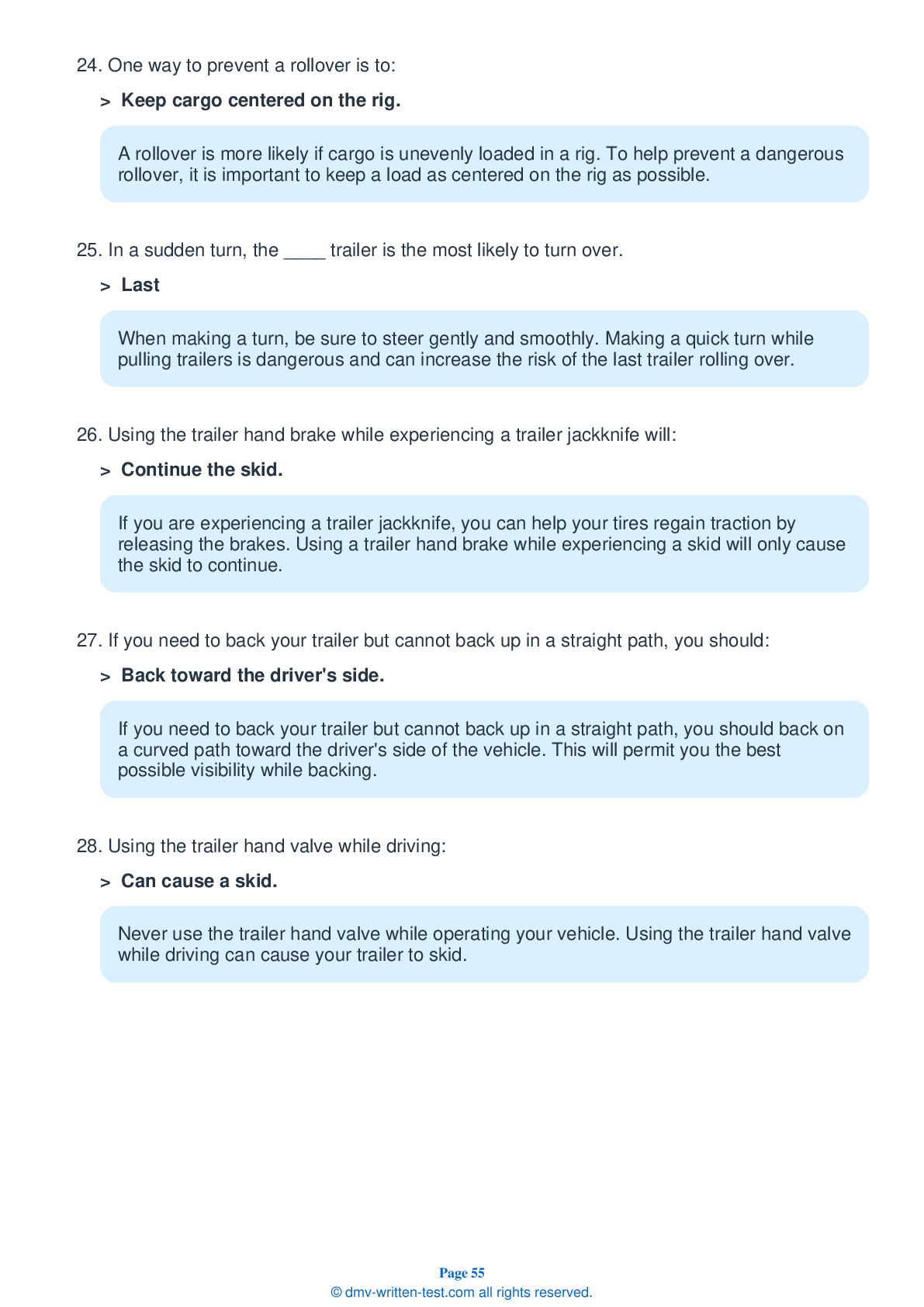Knowledge Test Class A
This license is required for driving any legal combination of vehicles, with a gross combination weight rating of 26,001 pounds or more, provided the GVWR of a trailer exceeds 10,000 pounds. To receive this license, applicants must pass a 50-question test. Test questions come from the North Carolina Commercial Driver License Manual. To pass, applicants must answer 40 questions correctly. Each question has three or four possible answer choices. Questions come from chapters covering: Introduction, Driving Safely, Transporting Cargo Safely, Air Brakes (if applicable), Combination Vehicles, Pre-Trip Vehicle Inspection Test, Basic Vehicle Control Skills Test and On-Road Driving. Endorsements that may be used with a Class A CDL are: Hazardous materials, Tank, Passenger, Doubles/Triples, HazMat, Tank, Air Brakes and School bus.
8. During the driving test, when encountering a railroad crossing, you should:
During the on-road driving test, do not stop, change gears, pass another vehicle, or change lanes while any part of your vehicle is in a railroad crossing.
9. If the spring brakes are activated, you should never:
Never apply the brake pedal if your spring breaks are activated. Brakes can be damaged if they are subject to both springs and air pressure.
10. If involved in a crash, basic procedures should include all of the following, except:
If you are involved in a crash, the three basic things you need to do are protect the area, notify the proper authorities, and care for anyone injured. It is important to protect the accident site immediately after the accident occurs to help prevent another crash from happening in the same location.
11. When preparing to enter traffic, you should do all of the following, except:
When crossing or entering traffic, bear in mind the size of your vehicle and the distance it will need to accelerate. Wait for a gap in traffic that is large enough to accommodate your vehicle before you begin to accelerate. Remember that you will need more room to accelerate if your vehicle is heavily loaded. Before crossing a road, be sure that you can get all the way across without interfering with traffic.
12. What should you do if your vehicle gets stuck on railroad tracks?
If your CMV gets stuck on railroad tracks, you should immediately leave the vehicle and get away from the tracks. Check the signposts or signal housing at the crossing for emergency contact information and call 911, or another appropriate emergency number.
13. Header boards:
Front-end header boards, also known as "headache racks," protect the driver from cargo moving in the event of a crash or emergency stop.
14. If your truck or trailer catches fire, you should:
If there is a fire in your vehicle, the first thing you need to do is leave the road and stop. Park in an open area away from anything that could catch fire, such as plants or other vehicles. Do not pull into a service station.
Frequently Asked Questions
To obtain a Class A CDL license in North Carolina, you will need to follow these steps:
1. Obtain a North Carolina Commercial Driver's License Manual and study it thoroughly.
2. Obtain a North Carolina Commercial Learner's Permit (CLP) by passing a knowledge test that covers general knowledge, air brakes (if applicable), and combination vehicles. To obtain a CLP, you must be at least 18 years old and hold a valid driver's license.
3. Practice driving with your CLP under the supervision of someone who holds a valid Class A CDL license.
4. Pass a road skills test that includes pre-trip inspections, basic vehicle control, and on-road driving.
5. Once you have passed the road skills test and obtained your Class A CDL license, you will be required to pass regular medical exams and maintain a clean driving record to keep your license valid.
It is important to note that there may be additional requirements or endorsements needed depending on the specific type of vehicle you will be driving or cargo you will be transporting.
1. Tractor-trailers: This is the most common type of vehicle that requires a Class A CDL license. Tractor-trailers are combination vehicles that consist of a semi-truck (tractor) and one or more trailers.
2. Tanker trucks: These are vehicles that transport liquids or gases in bulk, such as fuel, water, or chemicals.
3. Livestock carriers: These are vehicles specifically designed to transport livestock such as cattle, pigs, and sheep.
4. Flatbed trucks: These are trucks with an open-top trailer used to transport heavy and oversized cargo.
5. Refrigerated trucks: These are trucks with a refrigerated trailer used to transport perishable goods such as food and pharmaceuticals.
It is important to note that there may be additional endorsements or requirements needed for certain types of vehicles or cargo, so it's important to check with your local DMV for specific regulations.
1. Age: You must be at least 18 years old to operate a commercial motor vehicle within the state of North Carolina, and at least 21 years old to operate a commercial motor vehicle across state lines or transport hazardous materials.
2. Valid driver's license: You must have a valid driver's license issued by the state of North Carolina.
3. Medical certification: You must pass a medical examination and obtain a medical certificate from a certified medical examiner to ensure that you are physically qualified to operate a commercial motor vehicle.
4. Commercial learner's permit (CLP): Before taking the road skills test, you must possess a CLP and have held it for at least 14 days.
5. Knowledge tests: You must pass the required knowledge tests, which include general knowledge, air brakes (if applicable), and combination vehicles.
6. Skills test: You must pass a skills test that includes pre-trip inspection, basic vehicle control, and on-road driving.
7. Background check: You must pass a background check that examines your driving record and criminal history before being issued a CDL.
It is important to note that additional endorsements may be required for certain types of vehicles or cargo, such as hazardous materials or passenger transport.
For drivers who are 21 years or older, there are no additional age restrictions beyond the federal requirements. It's important to note that some employers may have their own age requirements that exceed the state and federal minimums.
1. Hazmat endorsement: This endorsement is required if you plan to transport hazardous materials.
2. Tanker endorsement: This endorsement is required if you plan to operate a vehicle that carries liquid or gaseous materials in bulk.
3. Double/triple trailer endorsement: This endorsement is required if you plan to operate a vehicle with two or three trailers attached.
4. Passenger endorsement: This endorsement is required if you plan to transport passengers in a commercial vehicle, such as a bus or shuttle.
5. School bus endorsement: This endorsement is required if you plan to operate a school bus.
To obtain an endorsement, you must pass additional knowledge and skills tests beyond the standard Class A CDL requirements. It's important to note that some endorsements may have additional age and experience requirements beyond the standard Class A CDL license.
1. Pre-trip inspection: You will be asked to do an inspection of your vehicle to ensure that it is safe to operate. This includes checking the brakes, tires, lights, and other important components.
2. Basic vehicle control: You will be asked to demonstrate your ability to control your vehicle in a variety of situations, such as backing up, turning, and shifting gears.
3. On-road driving: You will be asked to drive your vehicle on public roads while demonstrating safe driving practices, such as obeying traffic laws and signals, merging onto highways, and changing lanes.
You must pass all three parts of the skills test to obtain your Class A CDL license. It's important to note that the skills test must be taken in a vehicle that is similar to the one you plan to operate once you obtain your license. Additionally, you may need to obtain additional endorsements if you plan to operate specialized vehicles or transport specific types of cargo.
1. Air brakes restriction: If you take your skills test in a vehicle without air brakes, you will have a restriction on your license that prohibits you from operating vehicles with air brakes.
2. Automatic transmission restriction: If you take your skills test in a vehicle with an automatic transmission, you will have a restriction on your license that prohibits you from operating vehicles with manual transmissions.
3. Intrastate-only restriction: If you do not meet certain federal requirements, you may be restricted to operating commercial vehicles within the state of North Carolina only.
4. Hazmat endorsement restriction: If you have a hazmat endorsement on your license, you may be subject to additional background checks and security measures when transporting hazardous materials.
It's important to note that these restrictions and limitations may vary depending on your specific situation and driving record. Additionally, some employers may have their own restrictions or requirements for their drivers beyond those set by the state of North Carolina.
To request accommodations, you will need to submit a written request to the DMV and provide documentation of your disability and how it affects your ability to take the test. The DMV will review your request and determine what accommodations can be provided based on your specific needs.
Some examples of accommodations that may be provided include extended testing time, a private testing room, or a sign language interpreter. It's important to note that accommodations may not alter the skills or knowledge being tested or give an unfair advantage over other applicants.
If you need accommodations for the Class A CDL written test, it's best to contact the North Carolina DMV as soon as possible to begin the process.
If you fail the written test, the North Carolina Division of Motor Vehicles (DMV) will provide you with a score report indicating which questions you answered incorrectly. You can use this score report to study and prepare for the retake of the test.
In North Carolina, you are allowed to retake the written test as early as the next business day. However, there is a limit on how many times you can retake the test within a certain period of time. If you fail the test three times within a year, you will need to wait at least six months before you can retake it again.
It's important to note that there is a fee for each attempt at the Class A CDL written test in North Carolina. You will need to pay this fee each time you take the test, even if you are retaking it after a failed attempt. To save money and increase your chances of passing the test, it's recommended that you study and prepare thoroughly before taking the exam.




